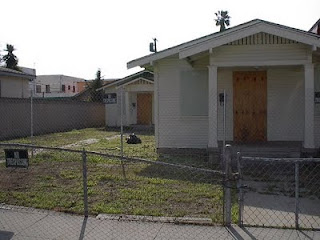 T
That's the daily question from my buyers today...
What's happening with my offer!? Even though I've been through all the
Short Sale Training and I'm even
HAFA Certified, I can't breach the chasm for communication with the banks holding the sellers' notes. If we're lucky, the listing agent is also well educated and certified. In that case, we may make some progress. Sometimes even with everything being done correctly and by the bank's requirements we still find ourselves at a standstill. A lot of buyers today give up and walk away. We're reaching a boiling point in the industry.
California Association of Realtors has been trying to help these lenders approach some semblance of organization so we have everyone conducting this business the same way. There is a lot of resistance from the larger banks. They want to use their own methods, paperwork and programs. So, in the meantime, as we try to get
"all our ducks in a row," the prime requirement for home purchases in today's market is
PATIENCE. It used to be 1)
Good FICO scores 2)
Verifiable Income 3)
Down Payment ...today we have to add one more to the buyers' list of requirements ...
PATIENCE. Sorry everyone, I hope this market will turn the corner soon on this issue. In the meantime, remember this is a
"Hurry Up and Wait" business.
Bring a book!
LA Times Article...
Banks are dragging their feet when considering so-called short sales, an increasingly prevalent type of real estate transaction in which lenders allow homes to be sold for less than what is owed on them, according to a survey of California real estate agents.
Nearly two-thirds of the 2,150 respondents to the California Assn. of Realtors' survey of member agents said banks took longer than 60 days to respond to short sale offers and that
fewer than three out of every five offers ultimately resulted in a sale.
The response times are much longer than those specified in government guidelines for banks who agreed to participate in programs that help troubled borrowers when they accepted a share of the $700-billion Wall Street rescue.
"The survey results show that the short sale system is clearly flawed," CAR president Beth L. Peerce said. "Increasing the number of successful short sale transactions is one important way we can help California families and move our economy closer to recovery."
Although the survey only covered agents in California, National Assn. of Realtors spokesman Walter Molony said similar complaints had come from across the country, especially from states with hard-hit housing markets such as Nevada, Florida and Arizona.
"Banks just have not been equipped or willing to make quick decisions on this," Molony said. "It's unfair to all parties concerned."
Short sales have played an increasingly large role in California's real estate market, with declines in property values leaving many borrowers with crushing payments on mortgages that are greater than their homes' worth.
The transactions allow troubled borrowers to dodge the hit to their credit scores that would come from a foreclosure, while banks are able to keep distressed properties off their books without going through the costly foreclosure process.
The estimated percentage of resales in the state that were short sales went from about
10% in 2008 to 18% in 2010, according to tracking firm DataQuick Information Systems.
But foreclosures are still much more common, accounting for nearly
38% of all resales in 2010, DataQuick said.
Richard Green, who directs the USC Lusk Center for Real Estate, said the market would benefit from avoiding foreclosures, which can lead to homes languishing on the market, by encouraging more short sales.
"Forcing banks to clear the market through short sales would almost certainly get us through this faster than we're getting through it," he said.
Green said he suspected banks were slow to approve short sales because the transactions force them to immediately report the difference between the sale price and what they're owed as a loss, rather than carrying the loan balance as a purported asset. He said some banks may also fear inadvertently letting property go for less than it's worth.
CAR had previously written to federal government agencies that oversee short sales to ask them to mandate faster responses by banks and to take other steps to foster more of the transactions.
The association said in the December letter to the Treasury and the Federal Housing Finance Agency, which oversees government-supported lenders Fannie Mae and Freddie Mac, that banks were not living up to the terms of the
Home Affordable Foreclosure Alternatives' short sale program.
Since most lenders have repaid their bailout funds to the government, participation in HAFA is now primarily voluntary, but CAR said the banks should still be bound by the agreement.
The association noted that banks were taking much longer to approve short sales than the time allotted by HAFA:
Ten days in cases where the lender has already decided on a selling price; 30 days if the selling price is being proposed by a listing agent.
CAR asked for the government agencies to force banks to complete all short sales following HAFA guidelines and to comply with the program's time frames. It also recommended increasing monetary incentives to banks for completing short sales.
Treasury spokeswoman Andrea Risotto said that her agency was still working on its response to CAR's letter, but that some of the requests — such as punishing banks for not meeting HAFA's time frames — would require legislative action.
A message left with the Federal Housing Finance Agency was not returned.
So hang in there everyone. It's a great time to buy, lowest interest rates in decades, inventory priced at affordable levels, good loan programs for qualified buyers ...
Patient, qualified buyers that is...
Charlie :) (and Dyna)











